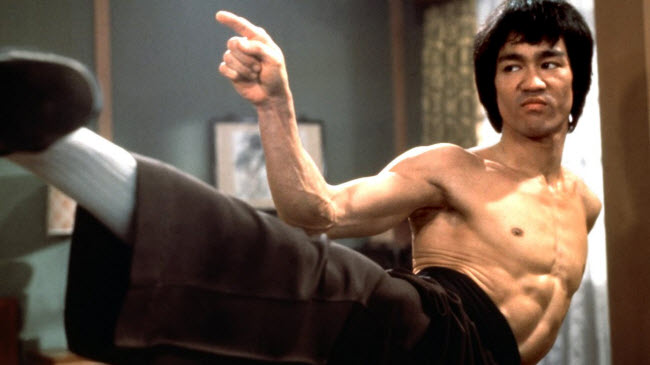On the morning of July 20, 1973, Bruce Lee, the young Asian martial arts expert and actor who was 32 years old at the time, woke up as usual and began his daily routine. He spent part of the day meeting with a producer to discuss his upcoming film and then visited a friend’s house. By nightfall, one of the most famous martial artists and action film stars of his generation was found dead, and news of his death spread quickly, shocking his fans. As the public processed this shocking news, many began to question how Bruce Lee had died. An official investigation revealed that his death was caused by a seemingly minor event with severe consequences that no one could have anticipated.

The Day Bruce Lee Died
Two months before his death, Bruce Lee had begun experiencing health issues. On May 10, during preparations for his new film Enter the Dragon, he felt dizzy and fatigued. He was taken to the hospital where he complained of severe headaches and had seizures. Doctors diagnosed him with cerebral edema, a condition caused by excess fluid buildup in the brain, leading to swelling and intense pain. After a brief hospital stay, Lee showed significant improvement and was eager to return to his normal activities. However, the opposite occurred.
After leaving the hospital, Lee resumed his usual activities and maintained his strict diet of vegetables, rice, fish, and milk, while avoiding baked goods, flour, and refined sugars. On the day of his death, he appeared to be recovering well, with only occasional headaches that were not considered a major concern.
On the day he died, Bruce Lee was in Hong Kong, where he had filmed many of his movies. He had a busy day starting with a meeting with producer Raymond Chow, with whom he spent most of the day discussing his upcoming film. He was reportedly very enthusiastic about the project. After the meeting, Lee went to the apartment of a friend, later identified as his Taiwanese actress girlfriend Betty Ting Pei. They spent several hours alone before planning to have dinner with Chow to finalize the film deal.
By 7:30 p.m., just before he was due to leave, Bruce Lee complained of a headache. Ting Pei gave him Equagesic, a common painkiller containing aspirin and a sedative known as meprobamate. After taking the medication, Lee went to lie down in the bedroom. When he did not come out after a few hours, Ting Pei went to check on him and found him unresponsive. Panicked, she called Raymond Chow, who also tried to wake Lee without success. They decided to call a doctor, who spent ten minutes trying to revive him but was unable to do so. The only option left was to send Lee to a nearby hospital by ambulance, but by the time they arrived, Bruce Lee was dead.
The Cause of Bruce Lee’s Death
As Bruce Lee’s body showed no external signs of injury, an autopsy was performed. The cause of death was determined to be severe cerebral edema, resulting from fluid buildup that increased the brain’s size by 13 percent. Producer Raymond Chow claimed that Lee’s death was due to an allergic reaction to the pain medication. The coroner’s report partially supported this claim, stating that Bruce Lee’s death was an accidental result of a secondary cerebral edema caused by the Equagesic.
Despite subsequent investigations supporting the coroner’s report, a flood of conspiracy theories persisted, similar to other Hollywood stars who died from drug-related complications at a young age, such as Elvis Presley and Marilyn Monroe. Many found the coroner’s report insufficient to dispel suspicions about his death.

Conspiracy Theories Surrounding His Death
Chuck Norris, a friend of Bruce Lee, suggested that Lee’s death was due to the use of muscle relaxants, sparking considerable debate. People speculated about other substances Lee might have taken, such as performance enhancers and herbal supplements. There was also a rumor that his death was caused by a sexual encounter with a prostitute who allegedly administered a powerful sex stimulant, leading to a fatal reaction.
Additionally, Betty Ting Pei faced accusations from Bruce Lee’s fans who claimed she had intentionally poisoned him as part of a secret society’s plot. However, there were no clear answers about why such a secret society would want Lee dead, and other theories blamed everyone from Italian, Chinese, and American mafias to his fans and even his family.
Among these theories, the most influential was the “Lee Family Curse,” which emerged 20 years after Bruce Lee’s death when his only son, Brandon Lee, followed in his father’s footsteps as an actor. In 1992, at the age of 28, Brandon was cast in a leading role in The Crow, a film about a murdered rock musician who returns from the dead to avenge his death and his fiancée’s murder. During filming, a bizarre accident involving a prop gun loaded with real bullets resulted in Brandon’s death. Just like his father’s, this tragic event led to rumors of conspiracy, despite official reports indicating an accidental death. The discovery that Bruce Lee’s elder brother had also died under mysterious circumstances before Bruce was born further fueled the rumors surrounding the Lee family.

Ultimately, while the medical and health-related explanation for Bruce Lee’s death may be the most convincing, the legend of Bruce Lee, a figure who inspired countless people to learn martial arts, is inevitably accompanied by various theories, whether alive or dead.
